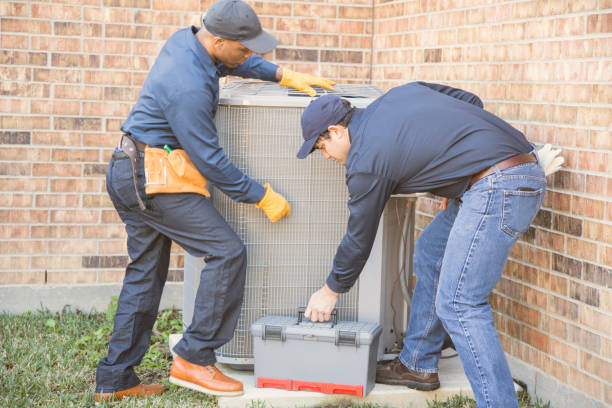(ThyBlackMan.com) In the fiercely competitive realm of heating, ventilation, and air conditioning (HVAC) services, the quest to stand out as one of the best companies is fraught with challenges and opportunities. Let’s delve into the multifaceted journey of becoming a top-tier HVAC company, exploring the road to excellence, the future landscape of the industry, and the strategies needed to navigate this demanding terrain.

Mastering the Craft: The Road to Excellence
Becoming a top HVAC company isn’t merely about offering standard services; it’s about mastering the craft and exceeding customer expectations at every turn. The journey begins with a relentless focus on technical proficiency and innovation. As explained by one hvac company, HVAC companies must invest in ongoing training and development programs for their technicians, ensuring they stay abreast of the latest technologies and industry trends. By empowering their workforce with the skills and knowledge needed to tackle complex challenges, companies can deliver superior results and set themselves apart from competitors.
However, technical expertise alone isn’t enough to thrive in the HVAC industry. Exceptional customer service is equally crucial. From the initial point of contact to post-service follow-ups, every interaction must be characterized by professionalism, empathy, and responsiveness. Building strong relationships with clients requires open communication, transparent pricing, and a commitment to resolving issues promptly. By prioritizing customer satisfaction and earning their trust, HVAC companies can foster long-term loyalty and generate positive word-of-mouth referrals.
Navigating the Evolving Landscape: The Future of HVAC Companies
As we look to the future, the HVAC industry is poised for significant transformation driven by technological advancements, shifting consumer preferences, and environmental concerns. One of the most prominent trends shaping the future of HVAC companies is the rise of sustainable and energy-efficient solutions. With increasing awareness of climate change and environmental sustainability, customers are seeking eco-friendly alternatives that minimize their carbon footprint. HVAC companies that embrace renewable energy sources, energy-efficient equipment, and green building practices will not only meet market demand but also position themselves as leaders in environmental stewardship.
Moreover, the convergence of HVAC systems with smart home technology presents new opportunities for innovation and differentiation. From Wi-Fi-enabled thermostats to IoT-enabled sensors, homeowners are increasingly embracing connected devices that offer greater control, convenience, and energy savings. HVAC companies that integrate smart technologies into their service offerings can deliver personalized solutions tailored to the unique needs and preferences of each customer. By leveraging data analytics and predictive maintenance, these companies can optimize system performance, reduce downtime, and enhance overall customer satisfaction.
Adapting to Challenges: The Impact of External Factors
However, achieving excellence in the HVAC industry isn’t without its challenges. External factors such as regulatory changes, economic fluctuations, and unforeseen events like the COVID-19 pandemic can pose significant obstacles to success. Companies must remain agile and adaptable, ready to pivot their strategies and operations in response to shifting market dynamics. Moreover, maintaining a strong financial foundation and risk management strategy is essential for weathering economic uncertainties and safeguarding business continuity.
Navigating through regulatory changes requires constant vigilance and proactive compliance measures. With environmental regulations becoming increasingly stringent, HVAC companies must stay informed about evolving standards and regulations related to energy efficiency, refrigerants, and indoor air quality. Failure to comply with these regulations not only exposes companies to legal risks and penalties but also tarnishes their reputation and erodes customer trust. Therefore, investing in regulatory compliance programs and staying ahead of regulatory developments is paramount for long-term sustainability and success in the HVAC industry. By embracing regulatory compliance as a strategic imperative, companies can mitigate risks, seize opportunities, and position themselves as responsible corporate citizens committed to environmental stewardship.
Strategies for Success: Navigating the Competitive Landscape
In such a competitive landscape, differentiation is key to standing out and attracting customers. HVAC companies must identify their unique value proposition and leverage it to carve out a niche in the market. Whether it’s specialized expertise in certain types of HVAC systems, a focus on customer-centric service, or innovative maintenance plans, companies must find ways to differentiate themselves from competitors. Moreover, investing in marketing and branding efforts can help raise awareness of their offerings and establish a strong presence in the minds of consumers.
To further enhance their competitive edge, HVAC companies can explore strategic partnerships and collaborations with complementary businesses. By aligning with suppliers, contractors, or manufacturers, companies can tap into additional resources, expertise, and distribution channels to expand their reach and capabilities. Collaborative ventures also offer opportunities for knowledge exchange, innovation, and cost-sharing, enabling companies to deliver greater value to their customers while maximizing operational efficiency. Moreover, strategic alliances can enhance brand visibility and credibility, as customers are more likely to trust companies endorsed by reputable partners. By forging mutually beneficial partnerships, HVAC companies can navigate the competitive landscape with confidence and unlock new avenues for growth and success.
Conclusion
In conclusion, standing out in a crowded field of HVAC companies requires a strategic blend of technical expertise, exceptional customer service, and forward-thinking innovation. By prioritizing continuous learning, fostering strong relationships with clients, and embracing emerging technologies, HVAC companies can differentiate themselves and thrive in a competitive market. As we anticipate the future of the industry, opportunities abound for those willing to adapt, innovate, and lead the way towards a more sustainable and technologically advanced future for HVAC services.
To further solidify their position as industry leaders, HVAC companies must also prioritize community engagement and corporate social responsibility initiatives. By giving back to the communities they serve through charitable contributions, volunteer programs, or environmentally sustainable practices, companies can enhance their brand reputation and foster goodwill among customers and stakeholders. Additionally, investing in employee development and well-being is essential for long-term success. By providing opportunities for growth, training, and work-life balance, companies can attract top talent, improve employee morale, and drive overall performance. As HVAC companies navigate the ever-changing landscape of the industry, these strategies will be instrumental in maintaining a competitive edge and achieving sustained growth and success.
Staff Writer; Jason Ford

















Leave a Reply